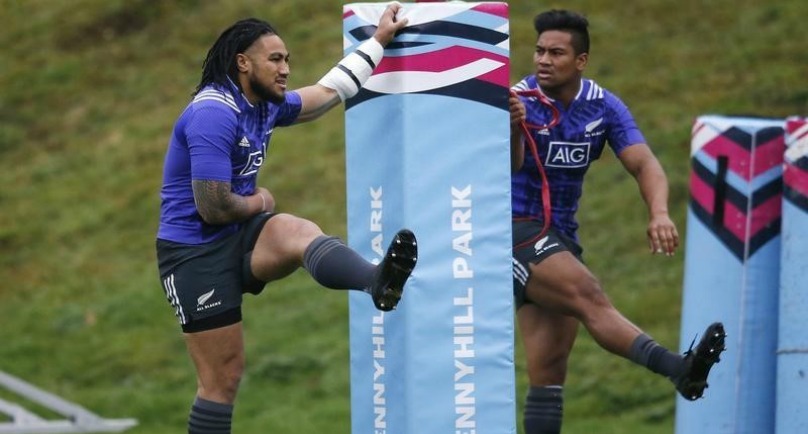Image: New Zealand’s Ma’a Nonu and Julian Savea (R) during training. Action Images via Reuters / Paul Childs Livepic
By Julian Linden
LONDON (Reuters) – Never has the old cabbage patch meant so much to so many so far away. Twickenham might be the spiritual home of English rugby but on Saturday it is the setting for a World Cup final between Australia and New Zealand.
For rugby fans the world over, it is a match that has all the ingredients of a classic: two traditional powerhouses with a long and acrimonious rivalry, both at the peak of their power, and playing for the greatest prize in rugby.
As Steve Hansen, the New Zealand coach whose deadpan delivery can be as blunt as his team’s rolling mauls, dryly noted: “You’ve got two sides who are like-minded and want to play footy.”
Despite the early exit of the host-nation, the 2015 World Rugby has been universally acclaimed as the finest ever, attracting record ticket sales of over 2.4 million (pounds), unprecedented worldwide television viewing and generating record profits of 160 million pounds.
From the moment Japan upset South Africa in the opening round, this has been a competition full of unrelenting drama and rugby of the highest order, and fittingly the two best teams are through to the final.
Australia (1991 and 1999) and New Zealand (1987 and 2011) have already won the World Cup twice each but this is the first time the two southern hemisphere giants have squared off in the decider.
As always, New Zealand are the favourites. For 24 years, the All Blacks were branded as chokers after slipping up at five successive World Cups but they rid themselves of the cruellest name in sport by winning four years ago and are an even better, more ruthless team now, losing just three of the 53 matches they have played since the last World Cup.
Led by their inspiring captain Richie McCaw, they sailed into the last four with consummate ease then showed they had the stomach for a fight when they held off South Africa 20-18 in the semi-finals.
No player has been under more scrutiny in the build-up to Saturday’s match than openside flanker McCaw, who has not made any announcements about his future but is expected to retire sometime after the tournament.
McCaw’s team mates Dan Carter, Ma’a Nonu, Conrad Smith, Keven Mealamu and Tony Woodcock have all already revealed they will be retiring from international rugby after the final whistle, adding a sense of poignancy to a country where rugby is a national obsession.
“When you grow up, you want to be an All Black,” McCaw said. “And you have to add to what has gone before you.
The Wallabies have battled their way to the final the hard way. In disarray a year ago, their new coach Michael Cheika has transformed a divided team that was regularly losing matches to the cusp of greatness.
Faced with the toughest pool in World Cup history, the Wallabies knocked out the hosts England then beat Wales to top their group, won a heart-stopping last-minute thriller against Scotland then saw off Argentina 29-15 in the semis.
ENDEARING MISFITS
In a sport that was once the domain of private schoolboys and beer-drinking university students, the Wallabies are also changing people’s perceptions with their unlikely band of endearing misfits.
No one personifies the eclectic make-up of the Wallabies more than Cheika himself. The son of a Lebanese migrant, Cheika worked for years in the women’s fashion industry, running a multimillion-dollar business, and speaks several languages, including Arabic, French and Italian.
“We’re not all guys who are camped out by the billabong with a cork hat,” he explained.
With a dynamic backline able to score tries from anywhere, a watertight defence and a goalkicker with nerves of steel in Bernard Foley, the Wallabies have all the working parts to beat the mighty All Blacks.
In number eight David Pocock, they also have a spiritual leader, an environmentalist, charity worker and advocate for gay marriages off the field, his blackened eyes and swollen broken nose from the on-field battering he has taken is testament to Australia’s willingness to sacrifice their bodies for the cause.
“Nothing binds a team together mentally more than working hard, sweating a little, spilling a bit of blood together,” Cheika said.
While Twickenham is a guaranteed a sell-out and London will embrace the final by showing the match on giant screens in Trafalgar Square and bars all over the English capital, nowhere is the sense of anticipation greater than Down Under.
Both former British colonies, Australia and New Zealand are the best of friends and the worst of enemies, but these are unprecedented times.
Their soldiers have fought and died alongside each other at wars, they are the first to help each other in times of trouble, and they have a free trade agreement since 1983.
But they are also great rivals. Like siblings, the two Pacific nations are constantly bickering and trying to outdo each other and nowhere is this more obvious than in sport.
Both nations are already on tenterhooks, with millions of people expected to wake in the middle of the night to watch the match live. Although the winner will be entitled to years of bragging rights, it’s the fear of losing that is causing most palpitations on both sides of the Tasman Sea.
They have been trading friendly insults all week with the heads of states and national airlines from both countries making bets on the outcome where the loser has to wear the winner’s colours to work.
“It will be a fantastic occasion, with both teams prepared to die for cause,” Carter said. “What’s happened in the past is irrelevant.”
(Editing by Amlan Chakraborty)
Copyright 2015 Thomson Reuters. Click for Restrictions.


